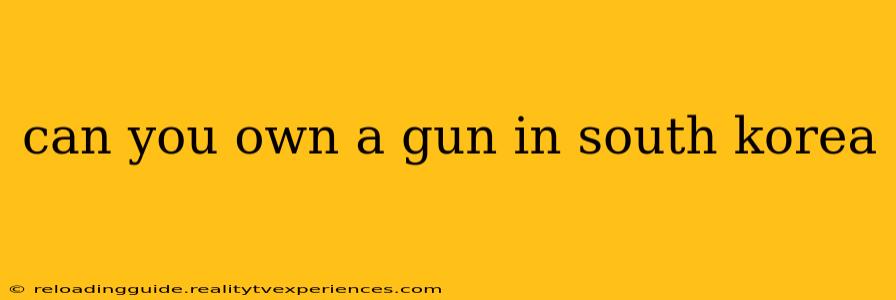South Korea maintains some of the strictest gun control laws globally. Owning a firearm in South Korea is exceptionally difficult and heavily regulated. While not entirely impossible, the process is rigorous, and obtaining a license requires meeting stringent criteria and demonstrating a legitimate need. This guide will delve into the specifics, clarifying the complexities surrounding gun ownership in South Korea.
The Reality of Gun Ownership in South Korea
South Korea's approach to firearm ownership prioritizes public safety and minimizing gun-related violence. The country's low rates of gun violence are a testament to the effectiveness of its restrictive regulations. This doesn't mean firearms are completely absent; however, their possession is tightly controlled, making civilian ownership a rare exception rather than the norm.
Who Can Obtain a Gun License?
The process is exceptionally challenging. To even begin the application, you must first meet the following criteria:
- Clean criminal record: Any past criminal convictions, especially those involving violence, will automatically disqualify an applicant.
- Valid reason: Applicants must demonstrate a compelling reason for needing a firearm. This is rarely granted for self-defense and typically only applies to specific professions such as security guards for licensed businesses or those involved in legitimate hunting or sport shooting. This requires extensive background checks and verification.
- Extensive training and testing: Applicants must complete rigorous firearms safety and handling courses, passing both theoretical and practical examinations to prove competency.
- Mental health evaluation: A psychological assessment is mandatory to rule out any mental health conditions that could pose a risk.
- Physical health check: Applicants undergo a medical examination to ensure they are physically and mentally capable of handling a firearm safely.
Even after fulfilling all these requirements, the approval process is far from guaranteed. Authorities carefully scrutinize each application, and rejection is common.
Types of Firearms Allowed
Even if licensed, the types of firearms permitted are severely restricted. Generally, only shotguns and air rifles are permitted for hunting or sport shooting, with strict limitations on caliber and ammunition capacity. Handguns are exceptionally rare, almost exclusively reserved for law enforcement and military personnel.
Penalties for Illegal Gun Ownership
The consequences of illegal gun possession in South Korea are severe. Penalties include significant fines, lengthy imprisonment, and a criminal record, which can have lasting repercussions on an individual's life. The government takes illegal firearm possession extremely seriously, reflecting its commitment to maintaining public safety.
Alternatives to Firearm Ownership for Self-Defense
Given the restrictive gun laws, South Koreans seeking personal protection typically rely on alternative methods such as:
- Self-defense classes: Martial arts and self-defense training are popular options for enhancing personal safety.
- Security systems: Home security systems, including alarms and surveillance cameras, are widely used.
- Neighborhood watch programs: Community-based initiatives contribute to enhanced security and crime prevention.
Conclusion: A Nation Prioritizing Public Safety
South Korea's stringent gun control measures reflect a national commitment to public safety and minimizing gun violence. While legal gun ownership is possible under very limited circumstances, it's an arduous and rarely successful process. The country's success in maintaining low rates of gun violence stands as a testament to the effectiveness of its strict regulations. The information provided here highlights the significant challenges faced by individuals seeking firearm ownership in South Korea. This should not be interpreted as encouragement to violate South Korean law. Always abide by the laws of the land.

